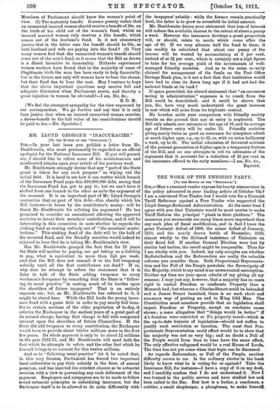MR. LLOYD GEORGE'S "INACCURACIES."
[TO THE EDITOR OF THE "SPECTATOR.")
SIR,—In your last issue you publish a letter from Mr. Braithwaite, who must presumably be regarded as an official apologist for the National Insurance Bill. If you will permit me, I should like to refute some of his misstatements and misdirected attacks upon your article of the previous week.
Mr. Braithwaite strongly denies that any "part of the State giant is taken for any such purpose" as wiping out the initial debt. It is hard to see how it can matter which branch of the Insurance Fund pays this £80,000,000 debt, seeing that the Insurance Fund has got to pay it ; but we can't have it shifted from one branch to the other as suits the argument of the moment. It is an important part of Mr. Lloyd George's contention that no part of this debt—this charity which his Bill bestows—is borne by the contributor's money : will he thank Mr. Braithwaite for refuting his argument ? He has promised to consider an amendment allowing the approved societies to invest their members' contributions, and it will be interesting in this connexion to note whether he regards the sinking fund as coming entirely out of "the members' contri- butions." This sinking fund of the debt will be the bulk of the invested fund, and the friendly societies would indeed be rejoiced to hear that he is taking Mr. Braithwaite's view.
Has Mr. Braithwaite grasped the fact that for 16 years the State will neither be paying, nor yet taking on a liability to pay, what is equivalent to more than lid. per week, and that the Bill does not commit it to the full twopenny subsidy until all the first contributors are dead ? If so, why does be attempt to refute the statement that it is false to talk of the State adding twopence to every workman's fourpence by remarking that the State is "follow- ing its usual practice" in casting much of its burden upon the shoulders of future taxpayers ? That is an entirely separate sin ; but, as Mr. Braithwaite has referred to it, it might be stated here. While the Bill loads the young insur- ance fund with a great debt in order to pay nearly full bene- fits to certain sections of the older population of to-day, it relieves the Exchequer in the earliest years of a great part of its normal charge, leaving that charge to fall with compound interest upon the shoulders of future Chancellors. If the State did add twopence to every contribution, the Exchequer would have to provide about twelve millions more in the first five years. Its whole payment is only to be about Pi millions in the year 1912-13, and Mr. Braithwaite will need both the fact which he attempts to refute and the other fact which he himself brings in to account for this twelve millions.
And as to "following usual practice" let it be noted that, in this very Session, Parliament has forced two important local authorities to pay their subsidy in the form of annual premium, and has inserted the strictest clauses as to actuarial revision with a view to preventing any such deferment of the payment. Employers and ratepayers are to be made to follow sound actuarial principles in subsidizing insurance, but the Exchequer itself is to be allowed to do quite differently with the taxpayers' subsidy : while the former remain practically level, the latter is to grow to sevenfold its initial amount.
Mr. Braithwaite denies your statement that loss of interest will reduce the available income to the extent of about a penny a week. However the insurance develops a great proportion will, or should, relate to needs which come after the age of 60. If we may allocate half the fund to them, it can readily be calculated that about one penny of the income will be wasted by accumulating at 3 per cent. instead of at 3i per cent., which is certainly not a high figure to take for the average yield of the investments of well. managed friendly societies. And as to the extra security claimed for management of the funds on the Post Office Savings Bank plan, is it not a fact that that institution would have had to close its doors long ago if it had not had the national funds at its back ?
If space permitted, his absurd statement that "an enormous saving in administration" expenses is to result from the Bill could be demolished ; and it could be shown that you, Sir, have very much understated the great increase in cost which will arise from its triplicate control.
He brushes aside your comparison with friendly society results on the ground that age at entry is neglected. The Bill only admits new entrants at the age of 16, and its average age of future entry will be under 15. Friendly societies giving nearly twice as good an insurance for ninepence admit at much higher ages, e.g., up to 25, or, with an extra halfpenny a week, up to 30. The initial admission of favoured sections of the present generation at higher ages is a temporary feature of the Bill, and no one attempts to rob its advocates of the argument that it accounts for a reduction of 25 per cent, in the insurance offered to the early members.—I am, Sir, &c.,
EQUITY.


















































 Previous page
Previous page